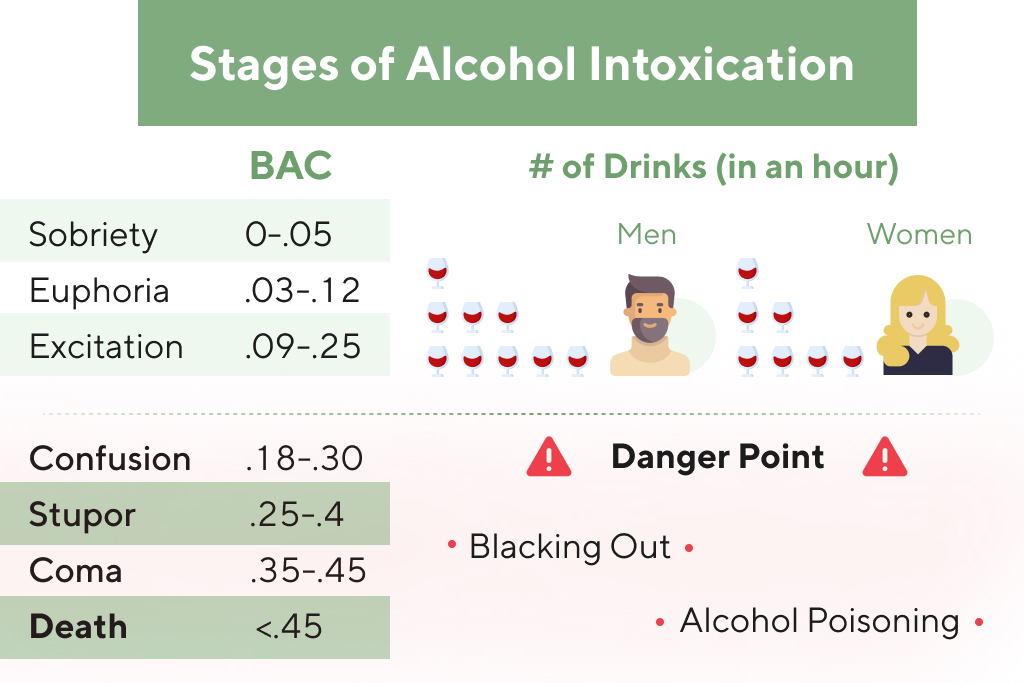While definitions can be variable, one way to look at this is the consumption of 4 or more drinks on an occasion (for women) and 5 or more for men. Additionally, excess alcohol is defined as drinking more than 8 drinks a week (women) and 15 a week (men), or consuming alcohol if you are pregnant or younger than age 21. In an acute sense, consumption of alcohol can lead to uninhibited behavior, sedation, lapses in judgment, and impairments in motor function.



In other words, alcohol-related psychiatric symptoms and signs can be labeled an alcohol-induced psychiatric disorder in DSM–IV or DSM–IV–TR without qualifying as syndromes. As is usually the case (Anthenelli 1997; Helzer and Przybeck 1988), the patient in this example does not volunteer his alcohol abuse history but https://ecosoberhouse.com/article/alcohol-misuse-long-term-effects-of-alcohol-on-the-body/ comes to the hospital for help with his psychological distress. The acute stressor leading to the distress is his wife’s leaving him; only further probing during the interview uncovers that the reason for the wife’s action is the man’s excessive drinking and the effects it has had on their relationship and family.
A model of care for co-occurring AUD and other mental health disorders
Some people can drink alcohol—and even over-indulge on occasion—without it becoming an issue. For others, drinking can turn into mild, moderate or severe alcohol use disorder, the term doctors and clinicians now use instead of alcoholism, alcoholic or alcohol abuse. Approximately 50 percent of clients with severe mental illnesses, such as schizophrenia and bipolar disorder, who are in community mental health settings develop AOD-use disorders during their lifetime. The rate probably is even greater among high-risk groups, such as young men with histories of violence or homelessness, and among patients in acute-care settings.
- The same as with other psychiatric disorders, AUD can also worsen the course of psychotic disorders.
- This is the equivalent of six pints of average-strength beer or six medium glasses of wine.
- Whether you’re seeking information or ready to start your journey to recovery, our intake specialists are here to support you every step of the way.
- Stabilization with medication and possibly hospitalization is a crucial first step in focusing on co-occurring mental health conditions.
- During withdrawal from heavy drinking, people may develop delirium tremens, a complication of withdrawal marked by psychotic symptoms, such as hallucinations (see Core article on AUD).
AOD-use disorders among severely mentally ill patients are correlated with poor concurrent adjustment in several domains and with adverse short-term outcomes, including high rates of homelessness, hospitalization, and incarceration. Severe mental disorders frequently are complicated by comorbid disorders, such as medical illnesses, mental retardation, and AOD abuse. Co-occurring AOD-use disorders represent the most frequent and clinically most significant comorbidity among mentally ill patients, and alcohol is the most commonly abused drug (Cuffel 1996).
Substance Abuse Treatment Programs
Consumption of alcohol has and continues to serve major roles in religious and cultural ceremonies around the world. But unlike most food products, in the last century, alcohol has been wrapped up in nearly perpetual controversy over its moral is alcoholism a mental illness effects and health implications. If you’re physically dependent on alcohol and need to stop drinking completely, stopping suddenly could be harmful. PTSD is one of the most common stress disorders and it affects millions of people each year.
- A 2020 review of research found that CBT allowed people with AUD to build coping and emotional regulation skills.
- There is a strong connection between alcoholism and mental illness, and the two often coexist or influence each other.
- For men, that typically is about five standard alcoholic drinks within a few hours; for women, this is four alcoholic drinks within the same period.
- Results showcased improvements in metabolic health, with no participants meeting metabolic syndrome criteria by study conclusion.
- The evidence overwhelmingly confirms the need for a model of care that is holistic and integrated – one that shifts the narrative from stigma and isolation to awareness and support.
The ketogenic diet (KD, also known as metabolic therapy) has been successful in the treatment of obesity, type 2 diabetes, and epilepsy. More recently, this treatment has shown promise in the treatment of psychiatric illness. The motion calls for suicide prevention training for school leaders, and fully-funded mandatory mental health training in schools and colleges. Almost nine in 10 teachers believe their job has adversely affected their mental health in the past 12 months, according to a survey.
